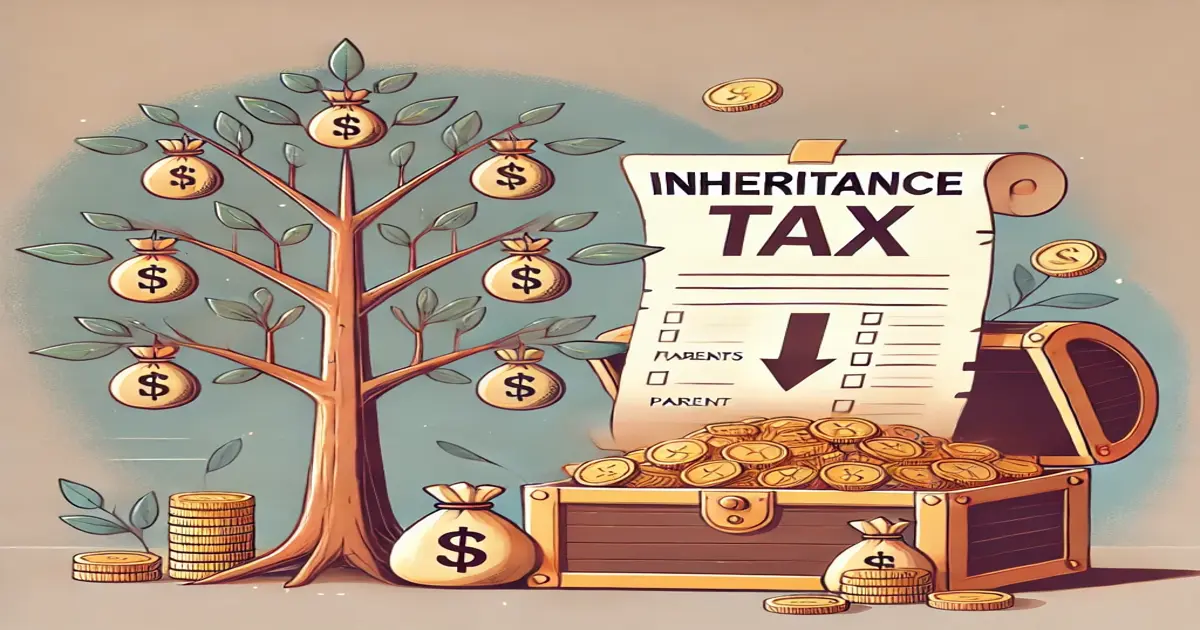How to reduce Inheritance Tax
Understanding Inheritance Tax and Its Implications
Inheritance tax (IHT) is a levy on the estate of a deceased person, including all assets like property, investments, and cash.
The standard rate is 40% on estates exceeding the tax-free threshold, which is currently set at £325,000.
Implementing strategic planning to reduce or eliminate this tax burden is crucial to ensuring your beneficiaries receive the maximum inheritance.
Strategic Gifting: Reducing Taxable Estate
One effective strategy to minimise IHT is through gifting. Gifts given at least seven years before death are exempt from tax, provided the donor does not retain any benefit from them.
Each year, individuals can gift up to £3,000 tax-free, along with small gifts of £250 to different recipients.
Additionally, gifts given in the context of weddings are exempt up to specific amounts based on the recipient’s relation.
Charitable Donations: Double Benefits
Donating to registered charities not only supports noble causes but also reduces your taxable estate.
Gifts exceeding 10% of the estate above the £325,000 threshold can lower the overall IHT rate from 40% to 36%. This dual benefit allows for significant tax savings while benefiting charitable organisations.
Spousal Transfers: Leveraging Exemptions
Transfers between spouses or civil partners are exempt from IHT, allowing the surviving partner to inherit the entire estate tax-free.
Furthermore, the unused portion of the deceased’s IHT allowance can be transferred, potentially doubling the tax-free threshold for the surviving spouse’s estate.
Property Allowances: Maximising Relief
If a primary residence is left to direct descendants, an additional “residence nil-rate band” can increase the tax-free allowance.
For 2024, this allowance adds £175,000, potentially raising the total tax-free amount to £500,000 per person.
Married couples can combine their allowances, effectively shielding up to £1 million from IHT.
Importance of a Well-Structured Will
A well-drafted will is crucial in estate planning, ensuring that your assets are
An unused portion of the IHT allowance can also be transferred, potentially doubling the tax-free threshold to £650,000.
The Residence Nil Rate Band (RNRB) can further increase this when passing on a family home, allowing for an additional £175,000 per person.
Utilising Property Allowances: Maximising Exemptions
For individuals leaving their primary residence to direct descendants, an additional RNRB of £175,000 is available.
This allowance, combined with the basic IHT threshold, allows a couple to pass on up to £1 million tax-free. It’s essential to have a clear will detailing these intentions to ensure beneficiaries fully benefit from these exemptions.
Importance of a Will: Ensuring Proper Estate Distribution
Creating and regularly updating a will is crucial in IHT planning. A well-structured will can utilise all available allowances and reliefs, ensuring that your estate is distributed according to your wishes and minimising tax liabilities.
It is recommended that you review your will regularly, especially after major life events such as marriage, the birth of children, or significant financial changes.
How to Reduce Inheritance Tax
Estate Planning
Lifetime Gifts
Charitable Donations
Spousal Transfers
Property Allowances
Writing a Will
£3,000 Annual Exemption
Seven-Year Rule
10% Rule for Lower IHT
Residence Nil Rate Band
Regular Updates
Professional Guidance: Navigating Complex Tax Laws
Given the complexities of IHT laws and the potential for significant savings, it is advisable to consult with legal and financial experts.
Professionals can provide tailored advice, ensuring that all available reliefs and exemptions are fully utilised, thereby preserving more of your estate for your loved ones.
By carefully considering these strategies and seeking expert advice, you can effectively reduce your estate’s IHT liability, ensuring that your beneficiaries receive the maximum possible inheritance.
Leveraging Trusts: Strategic Asset Management
Trusts can be an effective tool for managing assets and reducing IHT liabilities. By transferring assets into a trust, you can potentially remove them from your estate, thereby reducing the overall value subject to IHT.
Trusts come in various forms, such as discretionary trusts, bare trusts, and interest interest-in-possession trusts, each with unique benefits and implications.
Properly structured trusts can provide flexibility in asset distribution, offer protection from creditors, and allow for continued benefit to selected beneficiaries while minimising tax exposure.
Business Relief: Protecting Business Assets
For individuals owning a business, Business Relief (BR) can provide significant IHT savings. BR can reduce the value of a business or its assets for IHT purposes, potentially down to 0%.
This relief applies to shares in qualifying businesses, including those listed on the AIM market and unincorporated businesses like sole traders.
To qualify, the business must have been owned for at least two years before death and must meet certain criteria regarding trading activities.
Agricultural Relief: Preserving Family Farms
Agricultural Relief is available for those passing on agricultural property such as farms and farmhouses. This relief can reduce the value of these assets for IHT purposes by up to 100%, provided the property has been used for agricultural purposes and owned for at least two years.
This relief is crucial for preserving family farms across generations, ensuring that they remain operational and within the family without incurring a prohibitive tax burden.
Regular Reviews: Adapting to Legislative Changes
The tax landscape is continually evolving, with changes in legislation potentially affecting IHT planning strategies.
It is essential to review your estate plan regularly to ensure it remains compliant and efficient.
This includes reassessing the value of your estate, updating beneficiary information, and ensuring that all strategies, such as gifting or trusts, are still effective under current laws.
Conclusion: Proactive Planning for Peace of Mind
Effective IHT planning requires a proactive approach, combining various strategies to maximise exemptions and reliefs.
Individuals can significantly reduce their estate’s tax burden by considering lifetime gifts, charitable donations, spousal transfers, property allowances, trusts, and reliefs like Business and Agricultural Relief.
Seeking professional advice and regularly reviewing your estate plan ensures that your wishes are honoured and your loved ones are provided for in the most tax-efficient manner.
This comprehensive approach to inheritance tax planning minimises financial liabilities and offers peace of mind, knowing that your estate is protected and your legacy preserved.
Frequently Asked Questions
What is Inheritance Tax (IHT)?
Inheritance Tax is a levy on the estate (property, money, and possessions) of a deceased person. The standard rate is 40%, applicable to estates exceeding the tax-free threshold of £325,000.
How can I reduce my Inheritance Tax liability?
Several strategies can minimise IHT, including making lifetime gifts, leaving money to charities, utilising spousal and property allowances, setting up trusts, and claiming Business or Agricultural Relief.
What is the seven-year rule in gifting?
Gifts made more than seven years before death are exempt from IHT. If the donor dies within seven years, the gift may still be subject to tax, but taper relief may reduce the amount payable.
Are gifts to spouses exempt from IHT?
Yes, any assets left to a spouse or civil partner are exempt from IHT. Additionally, the surviving spouse can inherit the unused portion of the deceased’s IHT allowance.
How does leaving money to charity affect Inheritance Tax?
Donations to UK-registered charities are exempt from IHT. Moreover, if the donation exceeds 10% of the estate’s value above the £325,000 threshold, the overall IHT rate on the estate reduces from 40% to 36%.
What is the Residence Nil Rate Band (RNRB)?
The RNRB is an additional allowance of up to £175,000, applicable when passing on a main residence to direct descendants. This allowance can be combined with the standard tax-free threshold, allowing couples to pass on up to £1 million tax-free.
Why is it important to have a will?
A will ensures your estate is distributed according to your wishes and can help maximise tax-saving opportunities, such as utilising allowances and reliefs. It is crucial to keep it updated to reflect changes in circumstances or legislation.
How often should I review my estate plan?
It is recommended to review your estate plan regularly, especially after major life events or changes in tax laws, to ensure it remains effective and compliant.
For more information and personalised advice, consulting with a qualified professional is advisable.
Here are some general statistics related to inheritance tax and estate planning:
- Inheritance Tax Threshold: The standard tax-free threshold is £325,000. Estates above this value are taxed at 40%.
- Percentage of Estates Paying IHT: Approximately 4-5% of estates in the UK are subject to inheritance tax.
- Average Estate Value: The average value of estates subject to IHT varies but often exceeds £1 million due to property and asset accumulation.
- Charitable Donations: Donating 10% of the taxable estate to charity reduces the IHT rate from 40% to 36%.
- Business Relief: Qualifying businesses can reduce their estate’s taxable value by up to 100%.
These statistics highlight the importance of strategic planning to minimise tax liabilities.
For more detailed statistics and in-depth information on inheritance tax, estate planning, and related topics, you can refer to the following resources:
GOV.UK – Inheritance Tax – Official UK government site providing detailed guidance on inheritance tax rules, thresholds, and exemptions.
Office for National Statistics (ONS) – The ONS provides various data and statistical reports, including those related to estates and inheritance tax.
HM Revenue & Customs (HMRC) – HMRC offers information on tax reliefs, allowances, and statistical data related to inheritance tax.
The British Landlords Association is a national landlord association for UK landlords and one of the largest landlord associations in the UK. Join us now for £79.95!
Our top read blogs:
Guide to Calculating Tax on Rental Income
Understanding Council Tax Liability When Renting Property
The Rise of Special Purpose Vehicle Companies (Tax) in Real Estate: A Landlord’s Perspective
Tax advantage of buying a property using an offshore company in 2024
Disclaimer:
This post is for general use only and is not intended to offer legal, tax, or investment advice; it may be out of date, incorrect, or maybe a guest post. You are required to seek legal advice from a solicitor before acting on anything written hereinabove.





